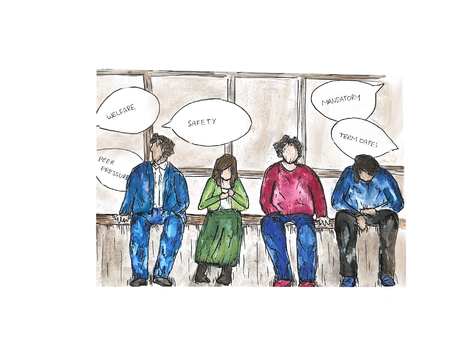Welfare workshops are broken
Daisy Stewart Henderson and Duncan Paterson clash over how to fix this Freshers’ Week staple

Daisy
Some memories are shared by most who have survived Freshers’ at Cambridge. The squeaky, giddy awkwardness of the first college bop, the muted terror of the first supervision, the candlelit awe of Matriculation Dinner, hoping never to be asked what where you’re from and what you study again by the end of it…
One thing I struggle to recall, though, is my college’s welfare workshops. I believe at least a couple of them clashed with other introductory talks I had to go to. Consequently, the ones I was at tended to be sparsely attended, which seems to be a trend across colleges year-on-year.
It’s not that the purpose of welfare workshops isn’t important. When faced with a bunch of eighteen-year-olds at the beginning of adulthood, representing a range of backgrounds and experiences, you could go as far as to say that colleges are obligated to convey core values surrounding respect and welfare to them. But if this is an obligation, welfare workshops represent a shirking of responsibility.
“Welfare workshops represent a shirking of responsibility”
As a fresher, I was impressed with the wealth of pastoral support available as a product of the college system. It’s unique, after all, to have access to a tutor, a director of studies, chaplains, counselling services, on hand and available to a cohort far smaller than most secondary schools. But why aren’t colleges making use of these resources to convey the messages of welfare workshops in a more individualised manner, delivered by an experienced adult as opposed to a fellow university student faced with the difficult task of conveying sensitive messages to big groups of freshers who are about the same age as them?
We all meet one-on-one with our tutors at the beginning of first year. At my college, the chaplains have started doing the same. These are wonderful opportunities to promote welfare in a very personalised way. Messages about respect and college values can be relayed in a way which suits the individual, in a direct conversation, rather than a one-size-fits-all workshop where it’s easy to sit back and disengage. One of the most special, and unusual, things about Cambridge is the fact that the college system enables staff to really know their students. So why are colleges passing the buck to students to deliver welfare workshops, which could so easily be embedded into systems that already exist; and work?
Duncan
I don’t remember my Freshers’ Week that well, but the thing that did stand out to me were the welfare workshops; precisely because they were so bad. A few students from the JCR awkwardly delivering welfare and consent talks to freshers only a year younger, sitting in the same place those committee members had been only a year before. No one was happy; not the freshers, told how to behave by people barely more experienced than them, nor the JCR members delivering workshops they weren’t confident on, let alone formally trained for.
College leadership must have been pleased though, right? Here was demonstrable evidence that they had delivered on guidelines passed down to them from University disciplinary bodies. Instructions on how to behave with basic human decency neatly bound up in a bureaucratic tick-box exercise.
Daisy argues that colleges are passing the buck with welfare workshops, and I do agree – initially. However, if you talk to any college’s head of welfare, they know deep down that workshops don’t work, but rather indicate a deeper problem; they don’t help people struggling with mental health issues, they don’t stop instances of sexual assault and when bad things happen, the mechanism that should allow college to come down like a ton of bricks on the perpetrator, rarely pulls through.
And this is not meant to be a dig at the students roped into running these workshops; they were asked to deliver something, and they did. The dig is at the thing they are delivering. Welfare workshops rarely function as they ought to. It would benefit students more to get rid of this farce, rather than attempt to integrate it into another welfare system. They are more for the protection of the college than they are for the victim.
“It would benefit students more to get rid of this farce”
Welfare workshops appear to follow the ethos of “prevention rather than cure”, educating students rather than waiting until incidents happen. But who has ever come out of a welfare workshop with a radically shifted mindset? As ever, it boils down to a societal culture, systemic issues that won’t be solved any time soon. Some argue that workshops are the first rung on the ladder towards a cultural shift, but to me, it feels more like a continuation of reliance on dysfunctional systems.
So whose responsibility is it? Undoubtedly, blame lies with the perpetrator, but where does it start? This is the million-dollar question, and as the mental health and sexual assault incidents continue to rise, it is up to the people who take on the duty of care, whether that be colleges, welfare teams, or University legislators, to find an answer.
 News / Colleges charge different rents for the same Castle Street accommodation2 March 2026
News / Colleges charge different rents for the same Castle Street accommodation2 March 2026 News / News in Brief: waterworks, wine woes, and workplace wins 1 March 2026
News / News in Brief: waterworks, wine woes, and workplace wins 1 March 2026 News / Climate activists protest for ‘ethical careers policy’1 March 2026
News / Climate activists protest for ‘ethical careers policy’1 March 2026 News / Angela Merkel among Cambridge honorary degree nominees27 February 2026
News / Angela Merkel among Cambridge honorary degree nominees27 February 2026 News / Private school teacher who lied about Cambridge degree barred from teaching27 February 2026
News / Private school teacher who lied about Cambridge degree barred from teaching27 February 2026









